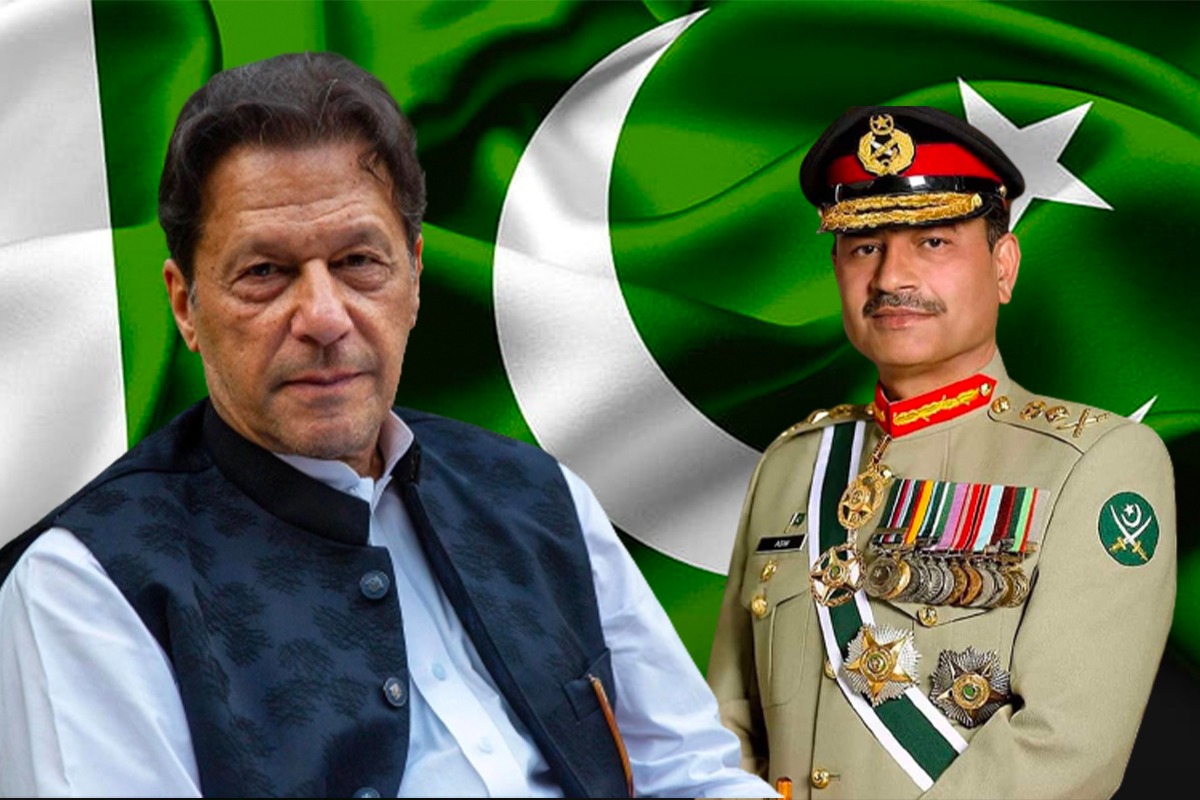Since emerging from detention last Friday, former prime minister Imran Khan has directly, and personally, targeted army chief Asim Munir in Pakistan’s ongoing battle royale. In doing so, Khan smartly switched the line-up from his party against the army to him against ‘one man.’
He has thus wisely drawn a distinction between the army and its chief – and so staved off the accusation that he is bringing down the prestige of his country’s army.
However, he has also raised the stakes. Having taken aim directly at the army chief, Khan has redrawn the intense chess game that has been underway in Pakistan in such a way that one of the two must get flicked off the board after a checkmate.
ALSO READ: Could a changed Pakistan be more amenable to peace efforts?
For the moment, Munir seems to have the upper hand. The violent turmoil that rocked the streets of Pakistan from Tuesday to Friday has subsided. At least three government employees who agitated have been sacked, while some of those who rudely challenged Munir in viral videos have publicly apologised.
Pressure tactics are evidently in play. There are reports of torture and gross ill-treatment of women and men supporters of Khan by state forces. Unrest has thus been suppressed, but pro-Khan sentiment surely still lurks beneath the surface and is loudly expressed in places like London and Houston.
Madarsa students affiliated with political groups close to the ruling coalition have been deployed on the streets and broke open the gates of court premises, evidently to pressure judges and Khan’s supporters.
ALSO READ: Imran Khan arrest: Pakistan army’s grip on polity may be forever altered
Khan himself now faces a plethora of cases, ranging from corruption to terrorism. He and his wife got bail from the higher courts, but he will remain under tremendous pressure from the various instruments of the law.
Since Wednesday evening, his mansion in Lahore has been surrounded by a vast and fearsome-looking posse of police.
Time is on Khan’s side
Khan’s smart stratagems will most likely keep him in the public’s mind, for he has proven a master of public communication. He issued several video messages on social media on Wednesday evening and invited social media influencers and other media onto his property to report that there were no terrorists there. (That being one of the charges.)
Khan has repeatedly spoken of a threat to his life, and parallels have been drawn with the assassinations of Murtaza and Benazir Bhutto. Since the public at large has demonstrated that the consequences would be bad if Khan were to end up dead or even severely injured, only a fool would try and do him physical damage.
ALSO READ: Dismay to elation—emotions swirl as Kashmiris watch Pakistan
The power of the army might make Munir think he and his force could weather the storm, but Munir is running against the clock.
Khan’s main advantage is that it’s tough to delay elections indefinitely – unless, of course, the army can muzzle the courts and the media long-term. For that, the army might need to take over power directly or even declare martial law – at least when the term of the current National Assembly ends.
As per the law, general elections must be held by October this year. As things stand, Khan’s party would sweep to power even if he were prevented from contesting a seat. A two-thirds majority cannot be ruled out, for only Sindh, the bastion of the Bhuttos, might remain immune to his charisma. Some opinion polls have even estimated 70 per cent backing.
The ISI’s been flat-footed
Munir may find it necessary to opt for a power grab involving all-round cruel repression. In order to really marginalise Khan, Munir would need to corner the courts, muzzle Pakistan’s media, and then deploy his forces across large parts of the country.
Munir’s chief weakness is that the top brass of the army was evidently not united behind him during the events of the second week of May. He was not the senior-most when he took charge less than six months ago – just when he was about to retire. Several officers immediately below him in the hierarchy would no doubt like to see his back.
ALSO READ: Could a shadow cold war be at play in Pakistan’s turmoil?
At least some of them must realise that the damage their institution has suffered may only get worse as long as Khan continues to snipe at Munir. They may calculate that the army might be able to resume some of its earlier prestige and extraordinary power if a change of guard at the top soothes things now.
Munir’s second weakness is that the ISI, the sheet anchor of Pakistan’s army, particularly in the dirty tricks department, proved to be a blunt instrument during and immediately after Khan’s abortive arrest on May 9. It evidently lacked intelligence and the ability to astutely process the information it had.
ALSO READ: How deeply is Pakistan’s army divided over Imran Khan imbroglio?
Indeed, Khan apparently had a far better flow of information, including secret intelligence, than the army – plus the ability to analyse that information to the best effect. Imran demonstrated that he is a far better strategist than the ISI, Munir – or, for that matter, Munir’s predecessor and mentor, Qamar Bajwa.
Video clips and recordings that circulated indicate that Khan was able to give instructions to his chief aides from wherever he was detained. Other clips indicate that leaks have emanated from the ISI’s torture chambers. So much for the much-vaunted ISI.
David Devadas is a journalist and security, politics and geopolitics analyst
Disclaimer: Views expressed above are the author’s own

